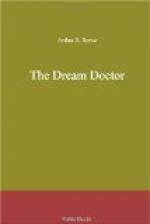“We opened the unlocked door. The first thing, as I recall it, that greeted me was an unmistakable odour of oranges. It was a very penetrating and very peculiar odour. I didn’t understand it, for there seemed to be something else in it besides the orange smell. However, I soon found out what it was, or at least Strong did. I don’t know whether you know anything about it, but it seems that when you melt real rubber in the effort to reduce it to carbon and hydrogen, you get a liquid substance which is known as isoprene. Well, isoprene, according to Strong, gives out an odour something like ether. Cushing, or some one else, had apparently been heating isoprene. As soon as Strong mentioned the smell of ether I recognised that that was what made the smell of oranges so peculiar.
“However, that’s not the point. There lay Cushing on his back on the workbench, just as Strong had said. I bent over him, and in his arm, which was bare, I saw a little gash made by some sharp instrument and laying bare an artery, I think, which was cut. Long spurts of blood covered the floor for some distance around and from the veins in his arm, which had also been severed, a long stream of blood led to a hollow in the cement floor where it had collected. I believe that he bled to death.”
“And the motive for such a terrible crime?” queried Craig.
Mr. Winslow shook his head helplessly. “I suppose there are plenty of motives,” he answered slowly, “as many motives as there are big investments in rubber-producing ventures in Goodyear.”
“But have you any idea who would go so far to protect his investments as to kill?” persisted Kennedy.
Mr. Winslow made no reply. “Who,” asked Kennedy, “was chiefly interested in the rubber works where Cushing was formerly employed?”
“The president of the company is the Mr. Borland whom I mentioned,” replied Mr. Winslow. “He is a man of about forty, I should say, and is reputed to own a majority of the—”
“Oh, father,” interrupted Miss Winslow, who had caught the drift of the conversation in spite of the pains that had been taken to keep it away from her, “Mr. Borland would never dream of such a thing. It is wrong even to think of it.”
“I didn’t say that he would, my dear,” corrected Mr. Winslow gently. “Professor Kennedy asked me who was chiefly interested in the rubber works and Mr. Borland owns a majority of the stock.” He leaned over and whispered to Kennedy, “Borland is a visitor at our home, and between you and me, he thinks a great deal of Ruth.”
I looked quickly at Kennedy, but he was absorbed in looking out of the car window at the landscape which he did not and could not see.
“You said there were others who had an interest in outside companies,” cross-questioned Kennedy. “I take it that you mean companies dealing in crude rubber, the raw material, people with investments in plantations and concessions, perhaps. Who are they? Who were the men who went on that expedition to the Congo with Borland which you mentioned?”




